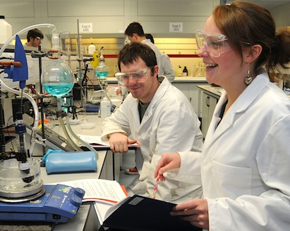Medicinal Chemistry Degree
Medicinal chemistry and pharmaceutical chemistry are fields that sit at the intersection of chemistry and pharmacology, and involve the design, chemical synthesis and development of pharmaceutical drugs. Students seeking a medicinal chemistry degree will study how to apply chemical research techniques to the synthesis of pharmaceuticals. Students who obtain a medicinal chemistry degree will possess the skills necessary to conduct research that can lead to new treatments for disease and the creation of new or improved drugs. Graduates can find employment working for government agencies like the Food and Drug Administration reviewing new drugs applications and testing drug compounds.
What Kind of Course Curriculum Does a Medicinal Chemistry Degree Require?
Students enrolled in a medicinal chemistry degree program will take all the standard courses required of chemistry degree students, which include courses in:
- General Chemistry
- Biochemistry
- Physical Chemistry
- Analytical Chemistry
- Inorganic Chemistry
- Calculus
- Physics
Students will also take courses in pharmaceutical chemistry and biology that will provide them with a fundamental understanding of how chemistry works on the body. These courses may include:
- Evolutionary Biology
- Cell biology
- Organic chemistry with lab
- Synthetic organic chemistry
- Principles of medical chemistry
- Chemistry of biological systems
- Research participation
- Mechanism of drug action
- Medicinal chemistry
What are Some Colleges that Offer a Medicinal Chemistry Degree Programs?
- University of Kansas at Lawrence offers both a bachelor’s and master’s degree in medicinal chemistry, and related degree programs in clinical laboratory science and clinical, hospital, and managed care pharmacy.
- University of Sciences in Philadelphia offers both a bachelor’s and master’s degree in medicinal chemistry, and related degree programs in clinical laboratory science, natural products chemistry, and pharmaceutics and drug design.
- University of Minnesota at the Twin Cities offers both a bachelor’s and master’s degree in medicinal chemistry, and related degree programs in clinical laboratory science.
Most pharmaceutical companies prefer to hire individual who possess at least a maters’ degree in medicinal chemistry who also possess research lab experience. Students should consider a fellowship as part of the education if they desire a career as a research scientist.
Salary Expectations for Graduates with a Medicinal Chemistry Degree
The median annual wage for chemists in 2008 was $66,230 a year according to the numbers compiled by the Untied States Bureau of Labor Statistics. The middle 50 percent earned between $48,000 and $89,000 a year, while the top 10 percent earned more than $113,000 a year. The starting salary offer for graduates with a bachelor’s degree in chemistry averaged $37,000 a year in 2009, according to the National Association of Colleges and Employers. The highest salaries were found in the federal executive branch and research and development. The bureau estimates an expected three percent employment growth for chemists in the job market between 2008 and 2018. Graduates who possess an advanced degree, especially those with PhDs, are expected to enjoy better job prospects working in research labs for larger pharmaceutical and biotechnology firms. Chemists held an estimated 84,000 jobs in the U.S. in 2008.

